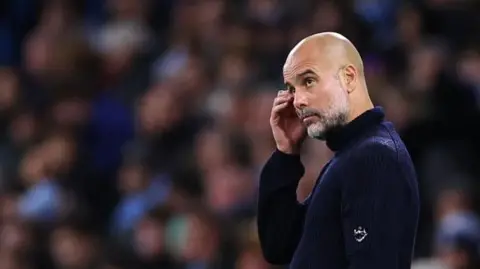
Manchester City manager Pep Guardiola confronted the harsh reality of his team’s shocking 4-0 home defeat against Tottenham Hotspur with characteristic honesty and reflection. Despite starting his post-match press conference by stating, “When you lose 4-0, there is not much to say,” he ended up saying quite a lot. His remarks encapsulated both his deep understanding of football’s cyclical nature and the unprecedented challenges his team faces.
The Unfamiliar Territory of Consecutive Defeats
Guardiola emphasized that setbacks are part of football’s natural rhythm, especially after an extended period of dominance. “A dip was inevitable,” he admitted. However, this particular slump is uncharted territory for him and for the club. The 4-0 loss marked City’s fifth consecutive defeat in all competitions—a situation Guardiola has never faced in his managerial career. For Manchester City, it’s the worst run since 2006, when Stuart Pearce was at the helm.
The implications are serious: if Liverpool win their next match against Southampton, they could open an eight-point gap at the top of the Premier League table, with a crucial showdown against City at Anfield looming. Guardiola acknowledged the gravity of the situation: “In eight years, we have never lived this. I knew sooner or later we would drop. Now we cannot deny the reality.”
A Historical Low Point
City’s current slump has produced some troubling statistics. This is the first time under Guardiola that they have lost three consecutive Premier League games. The 4-0 loss to Tottenham was also Guardiola’s heaviest home league defeat and tied for the largest loss of his managerial career, matching 4-0 defeats to Everton in 2017, Barcelona in 2016, and Bayern Munich against Real Madrid in 2014.
Key milestones underscore the severity:
- It’s City’s worst home league defeat since a 5-1 loss to Arsenal in 2003.
- This is the earliest City have been 2-0 down at home in the Premier League since 2010.
- Guardiola has now lost to Tottenham more times than any other opponent (9 defeats).
The match statistics were equally damning. City registered 23 shots but failed to score—a first since a 2-0 loss to Manchester United in 2021. In contrast, Tottenham capitalized on their opportunities, particularly through swift counter-attacks.
Defensive Vulnerabilities and Rodri’s Absence
A significant factor in City’s decline has been their vulnerability on the counter-attack. This season, they are facing an average of 1.17 shots on the counter per game, a significant increase from their previous high of 0.66. Against Tottenham, four of Spurs’ five chances in the second half came from fast breaks, highlighting a defensive frailty that was once rare for City.
Another glaring issue is the absence of Rodri, widely regarded as the best defensive midfielder in the world. His impact is quantifiable: since the start of last season, City have won 78% of Premier League games when Rodri plays, compared to just 50% without him. More strikingly, they have not lost a single game with Rodri on the field during this period, while their win rate drops to 43% without him.
An Aging Squad and Declining Form
City’s squad age is also becoming a concern. Players aged 29 or older have accounted for 52% of their league minutes this season—the highest in the Premier League. This aging core has struggled to maintain the intensity and consistency that defined their recent success. Guardiola acknowledged this challenge: “We are a bit fragile right now, that is obvious.”
The drop in form is evident in the numbers. Early in the season, City averaged 7.3 shots on target per game. During their recent slump, that number has fallen to 4.8, while opposition shots on target have risen from 2.4 to 6. Consequently, their goals-for and goals-against ratios have almost reversed—from 2.3-0.8 to 0.8-2.8.
Expert Analysis: A Sobering Reality
Football pundits have not minced words about City’s predicament. Former England striker Alan Shearer pointed out multiple issues: “There is plenty to work on. Defenders are not defending properly, and the press is not right all over the park.” Gary Neville described the defeat as a “sobering day” for the champions, while Jamie Redknapp remarked that City were “too easy to play against.” Micah Richards, a former City defender, expressed disbelief: “I am flabbergasted. Spurs showed great quality, but from Man City, it was truly awful. There is a lack of energy and conviction.”
The Road Ahead: Can City Bounce Back?
City’s next challenge is a Champions League fixture against Feyenoord, but all eyes are on their Premier League clash with Liverpool next weekend. If Liverpool win against Southampton, they could extend their lead to 11 points—a gap that Guardiola admitted might be insurmountable. “Yes, it’s true. If in the end, we don’t win, it’s because we don’t deserve it,” he stated bluntly.
Despite the gloom, Guardiola remains committed to addressing the issues head-on. “Football is a sense of mood,” he said. “We were always a consistent team, conceding few chances. Now, we concede more. There is not just one reason, but many.”
Conclusion: A Defining Moment for City
Manchester City’s current crisis represents a defining moment for both the club and its manager. Guardiola’s legacy has been built on adaptability and resilience—qualities that will be tested more than ever in the coming weeks. Whether City can reclaim their dominance or succumb to the pressures of an aging squad and stiff competition remains to be seen. What is certain, however, is that the road to recovery will require more than tactical adjustments; it will demand a renewed spirit and unwavering belief—a hallmark of Guardiola’s previous successes.
Leave a Reply